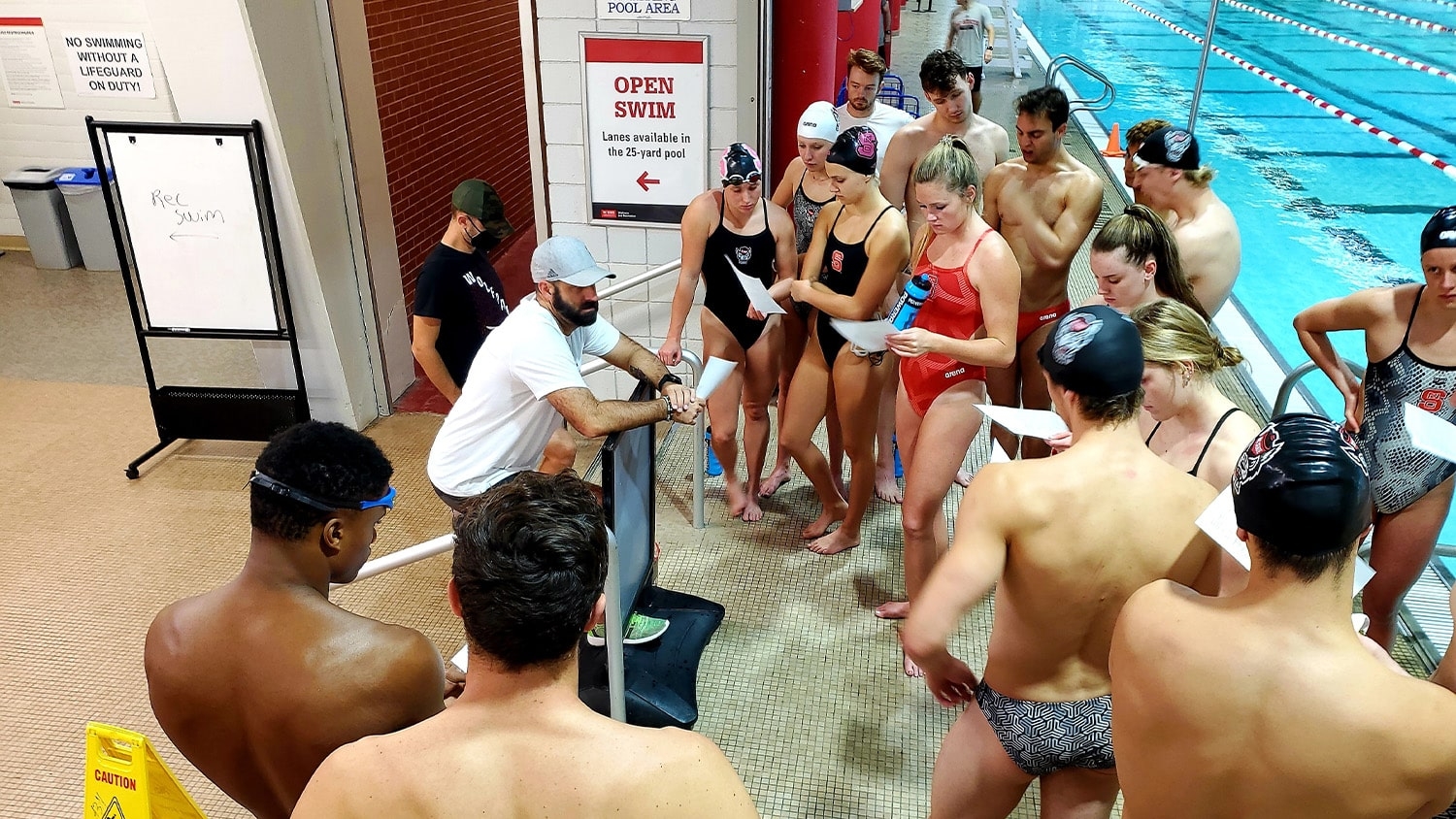Learning by Doing: A Look Inside Poole’s Risk Management Practicum

By Samantha Beavers
How can corporations improve sustainability? What steps can universities take to promote diversity, equity and inclusion? How can hospitals respond to staffing problems? These are challenges organizations face every day – and they’re questions that Poole College’s Master of Management, Risk and Analytics (MRA) concentration is setting out to solve.
Providing a foundation in enterprise risk management and data analytics, the degree program prepares graduates to think and do in a dynamic, data-saturated world. Students will learn to handle large amounts of unstructured data, look for trends and insights and then use this information to identify risks on the horizon – including the ones worth taking – to fortify organizations, advance strategic initiatives and tackle global problems.
And the best way to get them there? Through practical, real-world opportunities.
About Poole’s ERM Practicum Experience
For more than 12 years, Poole College students have helped organizations accomplish strategic objectives and manage their unique risks through the Enterprise Risk Management (ERM) Practicum course.
Working on small teams, students serve as consultants for companies across the nation, drawing out a client’s unique risk insights, aggregating them into major themes and providing recommendations and next steps to executive management.
“Most of the students who go through the ERM practicum will say, ‘Wow, this is the best thing I’ve done in graduate school,’” says Ericka Kranitz, director of the MRA concentration. “There is a sense of accomplishment in providing the organization with something of value to help them in their ERM journey. In the practicum, students can’t just read, regurgitate and scrape by. They do something real. They have discussions with management, listen to their concerns and challenges and then work together as a team to provide realistic recommendations and next steps for the company to consider.”
By participating in the practicum, students learn to apply the curriculum in a real-world context – and get to experience all the challenges that come with it.
“Most universities expose students to the real world through case studies. This is valuable, as students get to learn how course content works on a more practical level, but the practicum experience is different,” explains Mark Beasley, Poole College KPMG Term Professor of Accounting and director of NC State’s Enterprise Risk Management Initiative.
“With a case study, you’re learning something after the fact. But in the practicum, you’re rolling up your sleeves and tackling issues in real-time. Something that sounded simple in class may not be so simple when you start doing it, and you have to go through the struggle of adjusting it to make it work,” he continues.
In addition to learning project management skills and the intricacies of the business world, students also learn how to collaborate on teams and communicate with company executives. Along the way, Poole faculty coach students, teaching them how to effectively conduct interviews, make necessary tweaks and aggregate their results into a comprehensive report.
“We teach students how to elevate these reports to a level of perfection,” Beasley adds. “They’re used to getting up to maybe three drafts on a group project, but we’ll have them get all the way up to version 14. Students gain an appreciation for the importance of quality – and they walk away with real-world experience as if they had former employment.”
Adding Value to Clients
Since launching the ERM practicum, Poole College has worked with 50+ clients in the Triangle area and around the nation, including government agencies, local and corporate nonprofits, agricultural suppliers, refineries, community banks and institutions of higher education. Former participants include the YMCAs of the Triangle and of Greater Charlotte, departments within the state of North Carolina and multiple institutions in the University of North Carolina System.
“Whenever we partner with an entity to do a practicum, we make it very clear to them that we don’t want them to do it to help NC State out. Rather, we want them to participate so we can provide them with a report full of timely, valuable insights that they would otherwise have to pay a consultant for,” Beasley explains.
“It’s a world-class product that I would stack up against any professional consulting company report,” Kranitz adds.
The greatest value students bring to the practicum, Beasley explains, is an objective lens. By approaching the organization with an outsider perspective, students are able to aggregate data to tell stories and bring additional perspective to the elephant in the room.
“In some organizational cultures, there are a lot of frustrations that people want to raise to the management level but they’re afraid to say it. With an objective lens, students can highlight important risk insights and help executives see organizational realities from different angles,” Beasley says. “A lot of times, clients will tell students, ‘You nailed it. Thank you for getting that issue on the table, because it needed to be said.’”
Clients have also expressed that they appreciate how students neatly package the reports, evaluating risk in light of their strategic objectives. In doing so, clients can connect the dots – like noting how a talent problem in one department hinders their overall innovation efforts.
“I always tell the clients that when they get the final deliverable, there shouldn’t be something in there that surprises them. The goal of the practicum isn’t to deliver news, but to give better perspective. It’s intended to help clients see the big picture,” Kranitz says.
Powering the Future
According to Kranitz, the ERM practicum illustrates the value of Poole College’s ongoing partnerships with business and industry.
With various initiatives bridging the gap between the classroom and the real world – including the ERM Initiative, Supply Chain Resource Cooperative and Business Analytics Initiative – Poole gives students the opportunity to stretch the limits of their knowledge and solve complex problems.
“It’s almost like a circle of life type of thing. As our industry partners provide students with real-world experience, they bring value to their own company – both now and in the future. By participating in a practicum, they fuel the pipeline of talent, and they also get access to valuable insights that will help them position themselves for future success,” Kranitz says.
Looking ahead to Poole’s MRA program, the ERM practicum will press even further on the intersection of strategic risk and data analytics. Students will have the opportunity to zoom in on higher-impact risk issues and take a deeper dive into the data to support informed decisions that make sense strategically.
“In our traditional ERM practicum, we help clients get their arms around all of their risk issues and then prioritize them. With the MRA program, we’ll have students take a narrower focus and use predictive analytics to evaluate one particular risk,” Beasley says. “In doing so, they can help clients make a data-driven decision for their next strategic move.”
To learn more about NC State’s Master of Management, Risk and Analytics concentration, click here.
This post was originally published in Master of Management Risk & Analytics.


